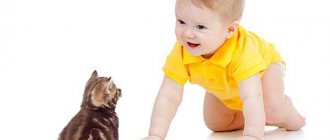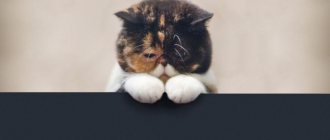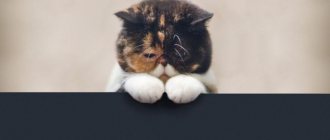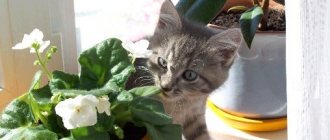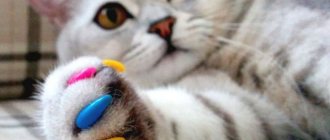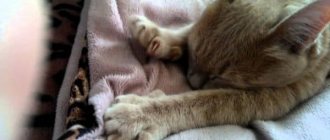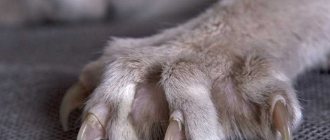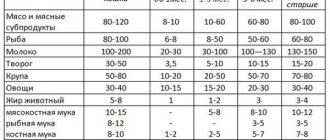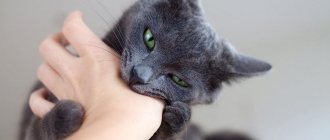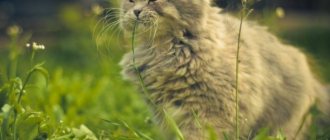In the absence of adequate nutrition, the cat eats cucumbers. This product replenishes the pet's missing vitamins and microelements. It should be taken into account that your pet most likely requires an additional intake of a vitamin complex or a switch to high-class food to compensate for the lack of substances. Owners of private sectors and summer cottages sometimes even have to use various options to scare away the animal in order to save the harvest.
Why does the cat eat cucumbers?
Often, felines prefer vegetables if their diet is too monotonous or, especially with a natural diet, the food does not have enough vitamins and microelements. Such options cannot be excluded when feeding an animal with cheap food, which may lack most of the important minerals and nutrients. Therefore, it is important to pay attention to your pet’s preferences or sudden changes in them. With this behavior, the cat tries to supplement the diet with a complex of vitamins and amino acids, as well as fiber.
Causes
Cats are naturally very constant animals. Even wild four-legged animals prefer to sleep in the same place, live every day the same way, and go hunting at the same time. Domestic cats live unnatural lives, hence the strange needs.
If you understand the metabolism of a wild cat, it becomes clear that it does not need anything other than its prey. Together with the caught rodent, the cat eats the entire contents of the intestine, which serves as a source of coarse fiber and beneficial bacteria. Sometimes wild cats eat vegetation to obtain vitamins and cleanse their stomach.
The diet of a domestic cat is radically different: meat, eggs, milk, cottage cheese, vegetables, fish...dry food. Complete distortion of the natural diet creates needs that are unfamiliar to wild animals.
Eating vegetables, including cucumbers, is one of these needs. By the way, even if cats eat vegetables, they prefer them raw.
Usually purrs prefer:
- carrot;
- Bell pepper;
- cucumbers;
- raw potatoes;
- leaf salad;
- cabbage
What do you think would happen if the cat chose its own diet? Surely it would consist of different types of raw meat... but here again the benefits of civilization make their own adjustments. To protect your pet from worms, meat must be boiled or doused with boiling water; you can prepare canned food and other dishes.
The type of meat is also an important factor. It is normal for a cat to eat rodents. Bird hunting is not entirely natural; wild cats rarely do this. What do pets get? Beef? Chicken? Is this natural?
Benefits and harms
Cucumber is a rich complex of vitamins and nutrients. Thanks to its composition, the animal is able to replenish a sufficient amount of microelements, as well as replace a single use of water with a vegetable. After consuming an agricultural crop, the cat’s body receives the required amount of vitamins B, C and PP. In addition to the vitamin complex, the product is rich in such useful substances as:
Iron is one of the substances this product is rich in.
- zinc;
- sodium;
- potassium;
- chlorine;
- iodine;
- iron;
- copper;
- magnesium.
All elements, when replenished in the body, improve the condition in the absence of an excessive amount of the mineral, but an excess of even one of the substances can significantly worsen the cat’s well-being.
This factor should also be taken into account in the presence of pathological processes in the pet. Many diseases can significantly change the body's production of a particular substance or hormone, which will lead to additional side effects. So, in case of urolithiasis, kidney pathologies, or if the animal is disabled and cannot move, excessive consumption of cucumber can complicate the condition due to its diuretic effect. Cucumbers are also undesirable for a nursing cat - the kittens will develop diarrhea with dehydration. For the same reason, it is not recommended to let small kittens chew the product. The vegetable can complicate the functioning of the gastrointestinal tract in diseases of the gastrointestinal tract.
Why do cats eat cucumbers?
Undoubtedly, all this is very beneficial for the health of furry pets. But if a cat constantly invades the beds, gnaws vegetables from the garden, tears up the soil, damaging the root system of plants - this behavior is not very acceptable for the owners of furry purrs, considering how much work and effort is spent on getting a good harvest. Therefore, we will consider how to wean a cat from eating cucumbers or other crops from the garden.
Most rural residents and summer residents consider cats to be pests, since cute furry pets often invade their garden beds. Some cats are real gourmets. They not only love to eat fresh crispy cucumbers from the garden, but also do not disdain salted or pickled ones. That is why tailed pranksters quite often inspect the beds in search of fresh cucumbers, nibbling on a healthy delicacy.
The worst thing is when animals only gnaw off the vegetables that have tied up or go to the toilet to go to the garden beds, constantly digging up the soil. In this case, you should not count on a good harvest. Therefore, if you notice that your beloved pet or someone else’s cat has gotten into the habit of climbing in the garden beds, you need to wean your pet off this bad habit as quickly as possible. So why do cats love fresh cucumbers?
Cucumbers are a very healthy vegetable crop containing more than 95% structured water. In addition to their pleasant taste, cucumbers contain vitamins (B1, B2, B6, C, PP), minerals (potassium, iodine, copper, zinc, magnesium, iron, chlorine, sodium), and other biologically active substances.
Important! Fiber, which is found in large quantities in fresh cucumbers, normalizes digestive processes in the body. Dietary fiber improves peristalsis, intestinal motility, and normalizes the functioning of the endocrine glands.
Therefore, if a cat eats cucumbers, it compensates for the deficiency of minerals, vitamins, fiber, amino acids, and other essential nutrients.
Can I give it to a cat?
You should not give this product lightly salted to your animal.
In the absence of pathological processes, lactation period and other negative factors, cucumber can and is even recommended to be given to an animal. The product, rich in vitamin complex and beneficial substances, has a beneficial effect on the body and will also prevent the cat from feeling thirsty. The only contraindication is taking lightly salted or canned cucumbers for your pet. They contain much less minerals, there is an excessive amount of salt and sugar, which will not have the best effect on the condition of the body.
Are cats afraid of cucumbers? How to properly scare a cat and is it worth it?
The whole world is going crazy over videos of cats that, for some reason, jump away in horror from ordinary cucumbers. Medialeaks decided to understand this strange phenomenon and answer all the questions that arise.
Come on. Are they really afraid?
Seems to be yes. Videos about the incredible horror that cucumbers suddenly appearing on the floor cause in cats have been appearing online for a long time, but this topic has gained popularity thanks to several collections of similar videos.
It usually looks like this: an unsuspecting cat eats from his bowl, turns around and jumps away in horror from the vegetable lying on the floor, striking a funny pose. With some cats this can be done more than once.
Accompanied by cheerful music, such collections collect millions of views.
How it works?
Comments from scientists and veterinarians on this topic are worthy of Captain Obvious, but we will quote them anyway. The thing is that cats are frightened by objects that suddenly appear on the floor in close proximity - they would prefer to get to know it at some distance. Your pet probably doesn't care at all whether it's a cucumber or something else.
“I think this is a reaction to the sudden discovery of an unusual object, secretly placed while they are busy with the bowl. Cats are suspicious of the unknown: it could be a snake or other predator. I suspect a toy spider, a plastic fish or a mask with a human face would produce the same reaction,” says animal behaviorist Roger Mugford.
It’s worth adding here that experts do not recommend scaring cats. Nothing bad will happen to him, of course, but you can ruin his psyche, and therefore the relationship with his pet, say experts interviewed by National Geographic.
“If you cause stress to an animal, that's probably not a good thing. If you're doing this for laughs, I have questions about your humanity,” urges California veterinarian Jill Goldman.
Think Like a Cat author Pam Johnson-Bennett explains that cats consider the bowl area to be the safest area in the house, so the appearance of an unexpected object in it frightens them so much that they try to escape in any way possible. "It's cruel," she says. John Bradshaw of the University of Bristol, who wrote the book Cat Feelings, said such human behavior was “contemptible.” Think about it.
But Reddit users who discussed this topic were skeptical about the experts’ comments.
“Life for domestic cats is really tough. Sleep, eat, sleep, put in the tray, sleep. To be ********, to sleep"
“My cat scares me, gets in my legs, pees on things, makes me wake up at 3 in the morning to open the door. Somehow I don't see an article written for cats about how painful these things can be for humans. Bastards"
“My cat sits all day in an air-conditioned room, can scratch whatever he wants, eats what I put in a bowl, drinks, sleeps and has absolutely everything. I think he will survive the jump from being scared of the cucumber. If not, he's an even bigger ******* than I thought."
“This was the funniest thing I've ever done with my cat. Over the course of a month, I collected sticker cards and covered my apartment floor with them, sticky side up. I mean THE ENTIRE FLOOR. It took hours. Thousands of little sticky squares. The cat was watching me from the sofa. He wanted to play with the rubber lizard. I threw it across the room. He got halfway there before he realized the stickers were on his paws. The cat rolled over on his back to remove them, and the stickers stuck to his back. I will always smile when I remember him walking into the bedroom with a look of disgust. Boredom in the pre-internet era was a terrible thing. I still miss this cat."
My cat is not afraid of cucumbers. This is fine?
And that's okay too. Inspired by such videos, people around the world began to try to scare their pets. Some didn't succeed.
The Komsomolskaya Pravda staff had an interesting evening and concluded that Russian cats are fearless.
“We dedicated yesterday evening to our own experiment. All Komsomolskaya Pravda employees who have cats brought home large cucumbers. When the cat was eating, they placed a cucumber behind his back and grabbed the camera or phone.
The cats reacted calmly. No one got scared, didn’t recoil, didn’t hiss, didn’t fly away, didn’t run away, it was even offensive! Our cats are desperate, brave and indifferent to cucumbers. Some sniffed, some nudged with their paws, some simply passed by without paying attention,” the publication writes.
After all, there are cats that really love cucumbers.
Bonus.
If, despite all the warnings, you want to scare your cat, but nothing worked with cucumber, here is a more effective remedy (be careful, it can also affect people).
How to stop a cat from eating cucumbers in the garden?
Noble gardeners are trying in every way to keep the cat away from the garden, so options for solving the problem are offered. Each housewife chooses the more preferable and convenient one from the list:
- Dense planting of vegetables. This reduces the area where the animal can move. This method is also useful in weaning your pet from defecating in the garden.
- Spraying the crop with sprays that are unpleasant to the cat's sense of smell. Options for treating plants with liquids that are contrary to the pet’s taste preferences cannot be ruled out. Often, summer residents also water the soil next to the vegetables that the pet is encroaching on.
- Using agrofilm or mesh. Fence the beds or cover the plants separately. Sometimes even a low fence is enough; it needs to be made at a level slightly higher than the cat’s height.
- Electrical devices for repelling animals. When choosing, it is important to consider the area of action of the ultrasonic repeller.
- Irrigation systems. Thus, the garden is always wet, and the cat will never succumb to water procedures due to temptation.
- Citrus repellents. Pieces or citrus peels placed next to cucumbers do a great job of scaring away cats. You can replace them with napkins or rags sprinkled with vinegar or ammonia. If not available, it is recommended to use water infused with onions, hot peppers or garlic.
By paying attention to the problem in a timely manner by replenishing the lack of vitamins with special complexes or changing the feed, many owners manage to eliminate the problem without using additional measures to protect the garden bed. Good nutrition will help prevent your cat from wanting to eat fresh cucumbers, especially looking for them in the garden away from her plate.
What to do with cats who love vegetables?
On the Internet you can find a large number of videos in which cats eat, and with pleasure, raw potatoes, cabbage, olives and other vegetables and fruits that are not suitable for them, and even in large quantities.
It is difficult to say what exactly is the reason for this behavior. Perhaps in an instinctively felt need, and perhaps in taste preferences. By the way, a cat tastes food about 18 times weaker than a human. And this despite the fact that cats have a very acute sense of smell.
The reason lies in the smaller number of taste buds, as well as in the method of feeding: a cat’s teeth are not intended for thoroughly chewing food; their main purpose is to tear off pieces of meat from game and immediately swallow them.
According to experts, a cat often bites cucumbers or raw potatoes because it feels discomfort in the oral cavity and thus tries to “massage” the gums or cope with tartar. Owners of pets with similar predilections should pay attention to this.
All cat owners who suddenly exhibit strange food preferences should carefully analyze their pet’s diet. Predilection for plant foods is not organically characteristic of predators and may be a sign of deviations in the state of their body.
In the wild, they eat the stomach and intestines of their herbivorous prey, which contain the necessary plant components in exactly the small quantities in which cats need them.
What's best for cats?
Based on observations of cats, it was found that almost all of them happily accept food containing potatoes, carrots or pumpkin. Only adult animals are recommended to add vegetable components to their food. The motility of their intestines depends on what vegetables cats eat, and if you add too much, you can get consequences in the form of gastrointestinal upset.
It is known which vegetables can be fed to cats, and which ones are definitely not? There are some that pose a danger and are toxic to pets - avocados, onions and garlic. These plants cannot be given in any form, and the cats themselves will not eat them.
By adding vegetables to dry food, you can better balance the diet and feed your cat more nutritiously. Additional minerals and vitamins will improve metabolism, add energy to the animal, and help overcome vitamin deficiency. Many branded foods already contain vegetable ingredients, and if your pet requires vegetables, he may need a higher-class food with more nutrients contained.
What vegetables should a cat not eat?
Onion and garlic
Contain toxic substances, very dangerous for cats. Consumption of even small quantities can lead to the death of the animal.
Avocado
Contains toxic substances.
Tomatoes
Contains solanine, which is poisonous to cats.
Potato
As discussed above, potatoes contain solanine, which is harmful to cats. It is not advisable to give your cat potatoes, either raw or boiled. Causes constipation.
Legumes (peas, beans, soybeans), white cabbage
They cause fermentation in the intestines, bloating appears, and cause gas formation.
Pickled, pickled, fried, canned vegetables should never be given to a cat. They contain large amounts of salt, vinegar, fat, various seasonings, onions, garlic and pepper. They are deposited in the kidneys, contribute to the development of urolithiasis, and are harmful to the liver and pancreas.
